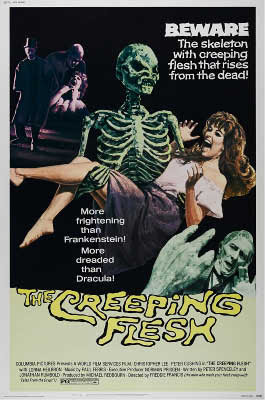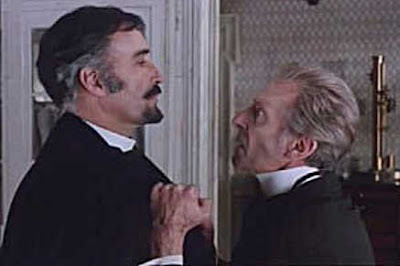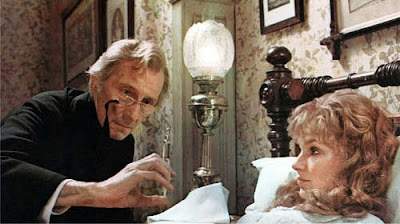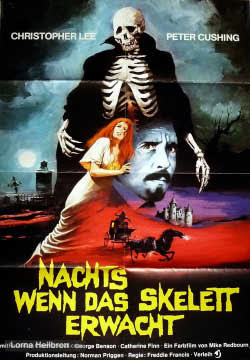The Creeping Flesh

Director: Freddie Francis
Year: 1973
Rating: 6.0
With Christopher Lee, Peter Cushing and Michael
Ripper performing and Freddie Francis directing, you would expect the film
to be a Hammer production or possibly Amicus, but this is in fact from Tigon
British Film Production. They are not nearly as well-known as either Hammer
or Amicus, but they produced some excellent horror films - Witchfinder General,
Curse of the Crimson Alter, The Body Stealers, The Blood on Satan's Claw
as well as a few others. It is a peculiar film in that there are no heroes
in it - Cushing plays an anthropologist and scientist in Victorian England
who thinks he has found a cure for evil and experiments on his own daughter
- and his half-brother, Lee, is an ambitious and ruthless director of a mental
asylum. The film is like watching a baseball pitcher with a slow wind-up
until he finally releases the ball. Then zip. It takes off. But in a quiet
restrained manner. Perhaps too much so. With a title like Creeping Flesh
and the wonderfully misleading poster, it should have a lot more creeping
or flesh and at least a lot more terror. But what it does have in its favor
is a surprisingly bleak ending.

Emmanuel (Cushing) has returned from New
Guinea with the skeletal remains of an alien looking creature - a huge skull
and an over-sized rib cage. When he cleans its fingers with a wet cloth,
flesh begins to grow on it. He cuts off one finger and experiments with it
- he thinks this creature may be the answer to curing evil. That evil is
a virus. He experiments with a solution of blood from the finger on his inhibited
and overly protected daughter (Lorna Heilbron). Never a good idea. She begins
to go insane and decides to visit a bar where prostitutes deal in their trade.
Nice going father. His half-brother James (Lee) learns of this creature and
decides to steal it. In the rain. At this point you expect it will go on
to unleash horror and destruction but it pulls back its punches as if that
would be too obvious.

The film wanders around too much and doesn't
really pull up its socks till the final 30-minutes. There is a sub-plot of
an escaped patient from the mental asylum that never amounts to much. Another
sub-plot centers on Emmanuel's wife - placed in his brother's mental institution
years before and telling his daughter that she had died. What gets short
shrift is the monster itself - we never really see it fully formed for more
than a few seconds. I would have thought that would be the selling point
of the film. Too many plots in this cake. This turned out to be one of Tigron's
final films.




